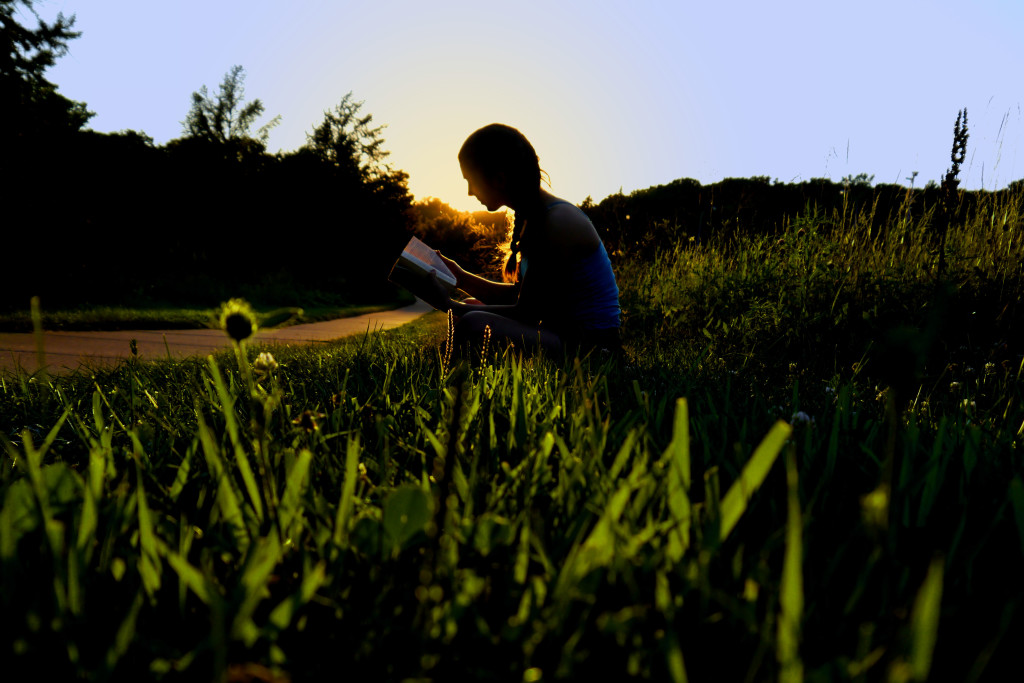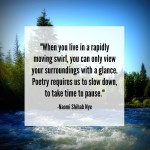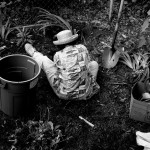
Poetry intimidates me. It makes me feel underdressed for the occasion. It drops names I don’t know. Sometimes, it makes fun of my plain Midwestern accent. It wasn’t always this way.
I first met poetry–where else?–in the unpretentious pages of Dr. Seuss as I read about the red fish and the blue fish and the infamous Sam-I-Am. Next came the poems of Jack Prelutsky and Shel Silverstein. Every kid I knew had a copy of Where the Sidewalk Ends or A Light in the Attic. Not long after that, my parents introduced my brothers and me to the aptly named anthology 100 Famous Poems. I didn’t understand a lot of what I read–much of it was grim 19th-century stuff about graveyards and lost love and ships at sea–but it fascinated me anyway.
When I was 10, I received a shabby leather scrapbook that had belonged to my great-grandmother. It was full of poems she had written, and the spidery script had nearly faded away in some spots. She had written them in 1918. I was thrilled. It was my first realization that my great-grandmother had once been young. She hadn’t always lived downtown in a high-rise apartment with a conch shell on her coffee table. She hadn’t always worn bifocals and moved slowly. She had been young and full of poetry. It was also the first time I realized that normal, everyday people could be poets. People like my great-grandmother. People like me.
I began to fill an empty journal with poems of my own. I wrote recklessly, without knowing the rules or how it all worked. My scratchy 4th-grade handwriting was terrible and full of scribbled out words, and the verses were full of feeling and cliche. Later on, I began to read Langston Hughes and Emily Dickinson. Mary Oliver and Maya Angelou. I discovered that poetry could be protest. It could be funny. It didn’t have to rhyme. But once I began college, poetry became the realm of specialists, of people who majored in Creative Writing or wanted to teach English. In my journalism classes I learned to write practical things like obituaries and press releases and recaps of city council meetings. I not only stopped writing poetry, I stopped appreciating it too.
Two years ago, a visit from a spoken word artist drew me back to poetry. My church hosts an arts conference every year and poet Micah Bournes was one of the guest artists. He gave a short lecture on creative writing and addressed common misconceptions about poetry. Bournes isn’t a lofty academic, and his poetry is about real life–faith, stereotypes, doubt, even shampoo. He showed us a clip of jazz and soul poet Gil Scott Heron from the 1980s. Among other things, Heron makes the point that “poetic” doesn’t mean pompous or confusing. Poetry is communication. As Bournes said, it’s the language of emotion. That day I was reminded of the lesson I first learned from my great-grandma’s scrapbook: Ordinary, everyday people can be poets. And ordinary, everyday people can appreciate poetry too. I’m still intimidated by it, but I’m hoping that won’t always be the case.
This month, poetry will be my focus for the blog. In celebration of National Poetry Month, I’m going to post a poem a day. (Not my own, I’m not that brave yet.) If the poem is in the public domain, I’ll post it here. If it’s not, I’ll post a link to a site that has received permission to publish it.





I can’t wait to read the poems you post this month!!
Thanks! I’m looking forward to revisiting old favorites and finding some new ones!